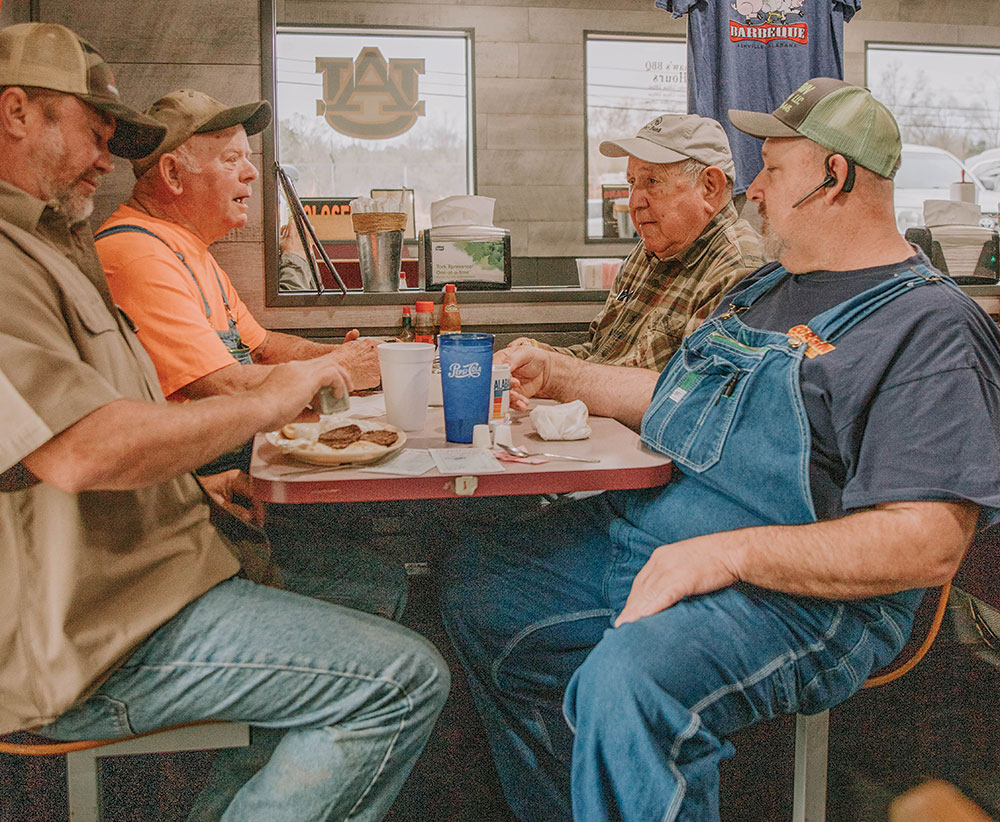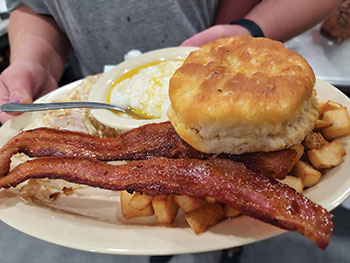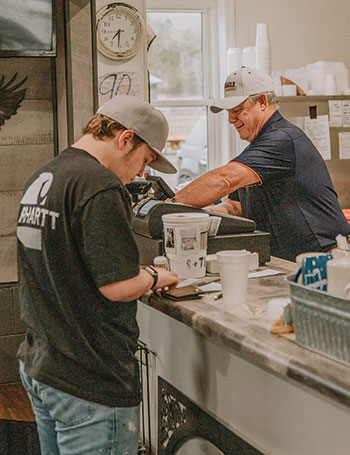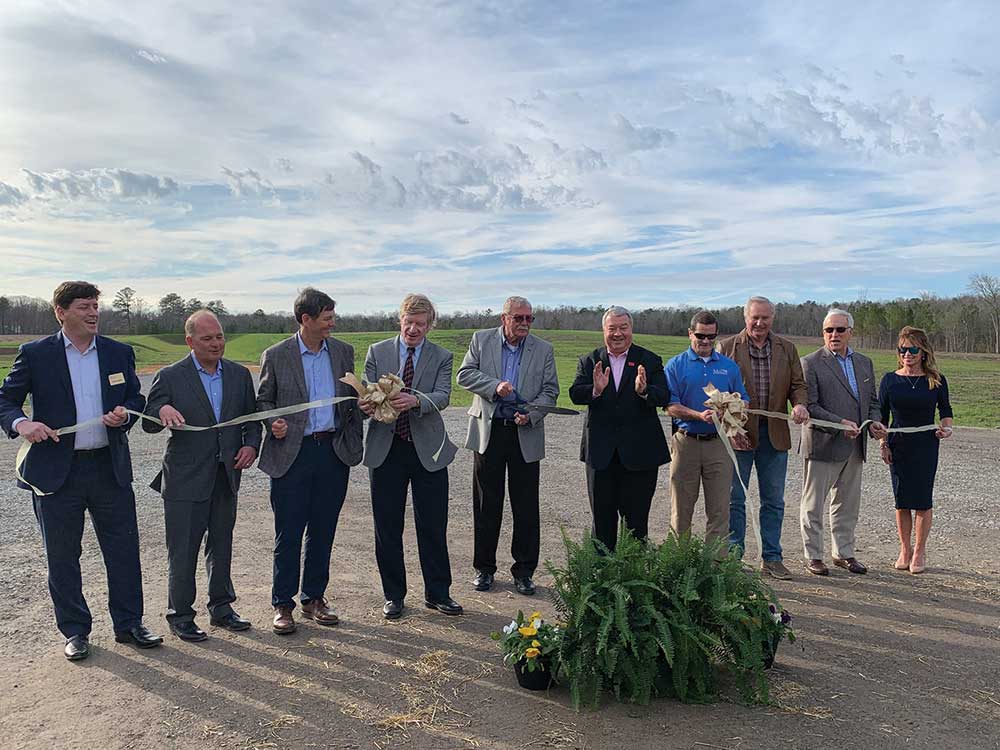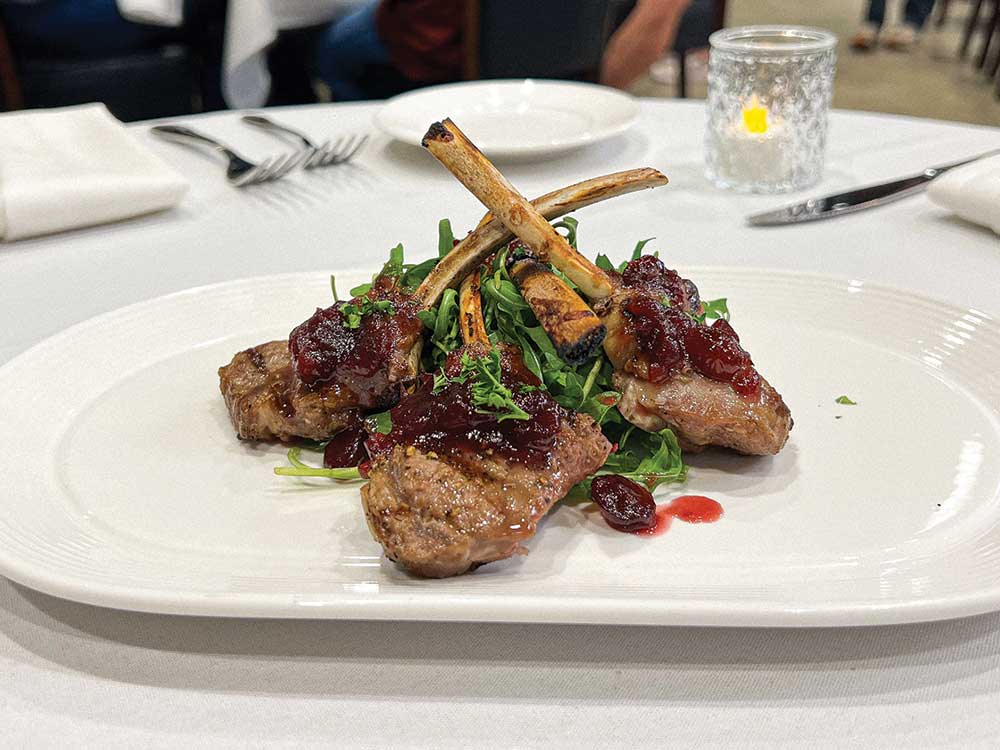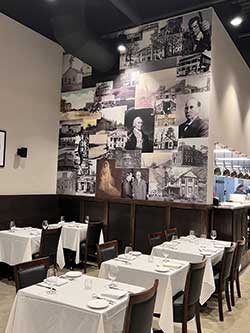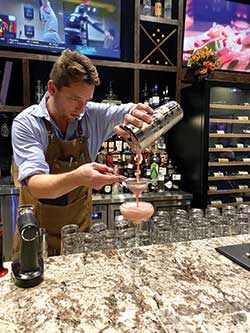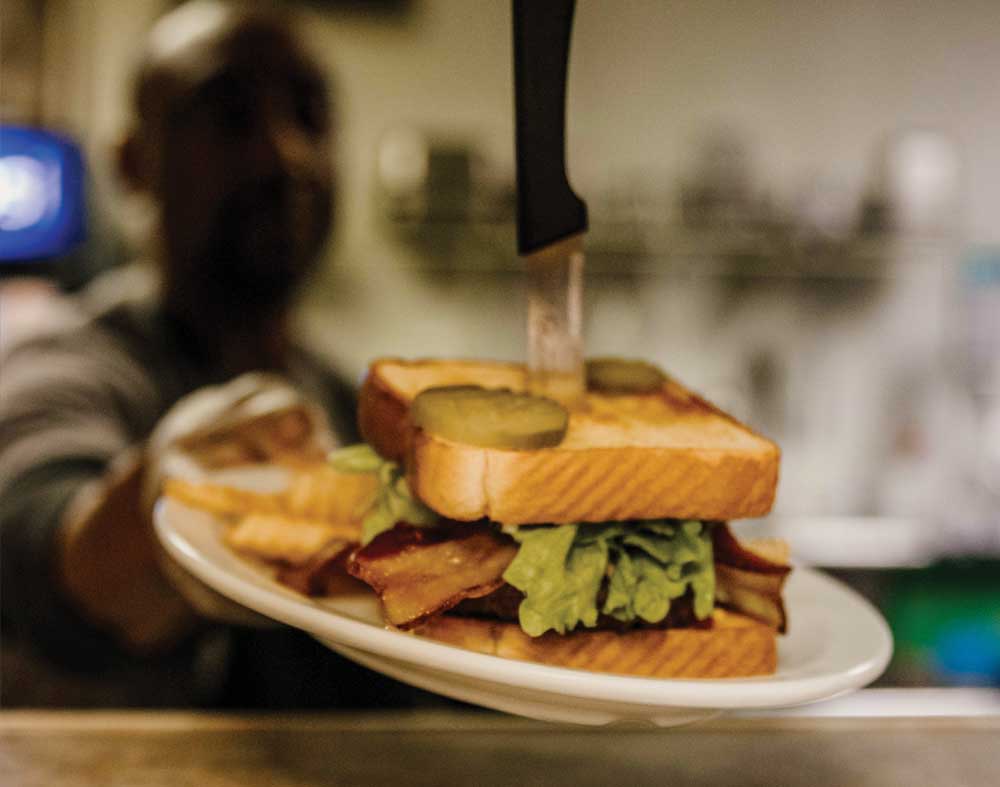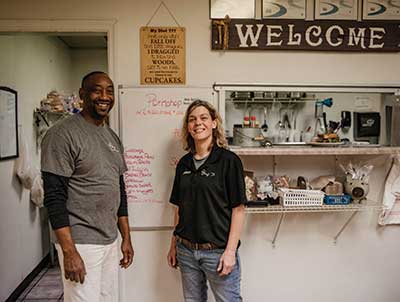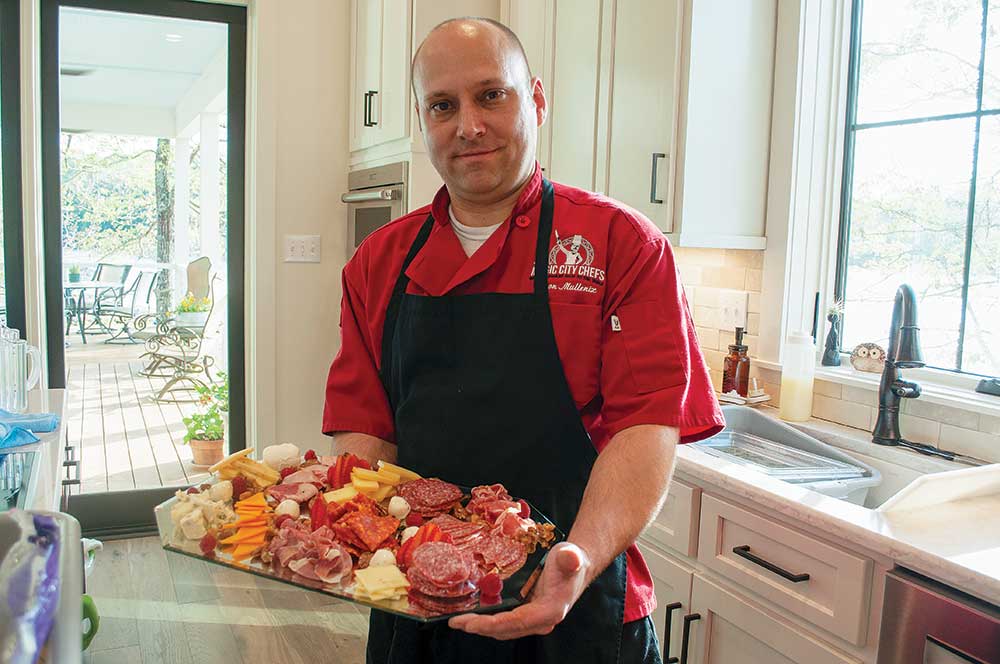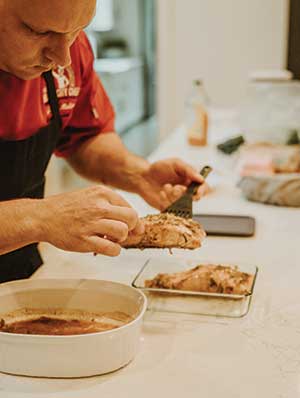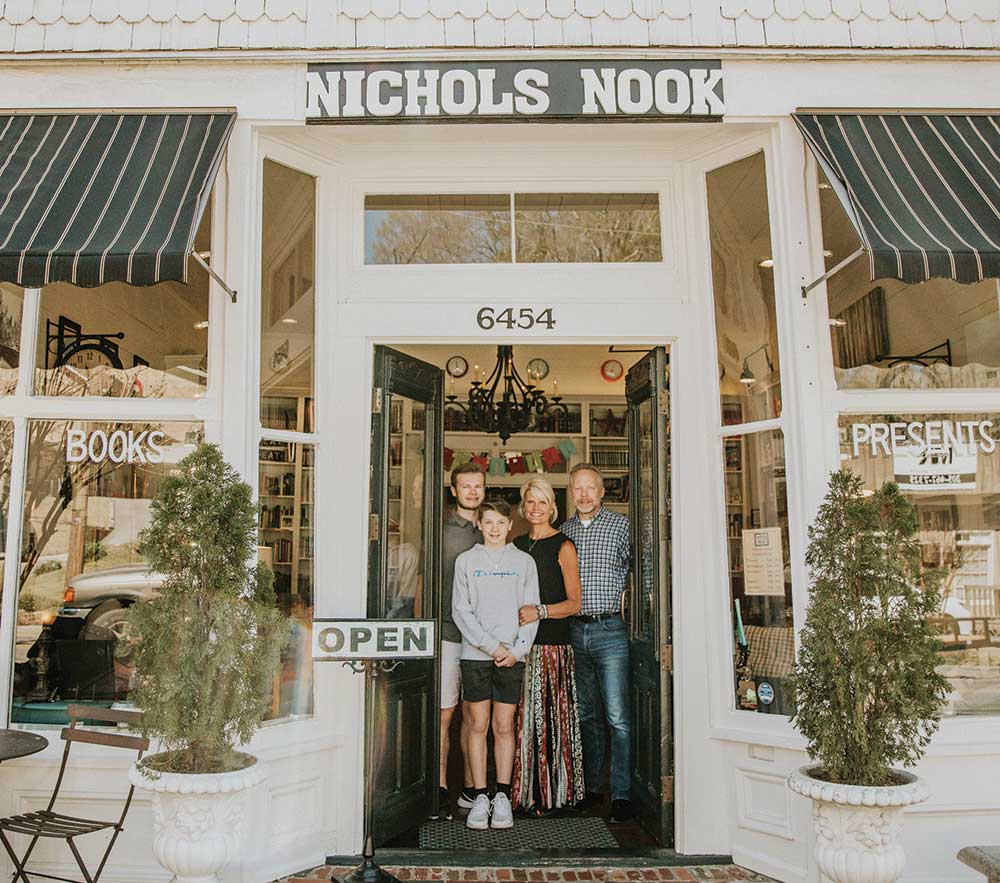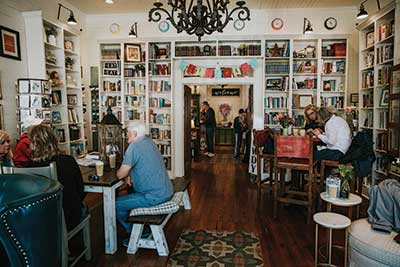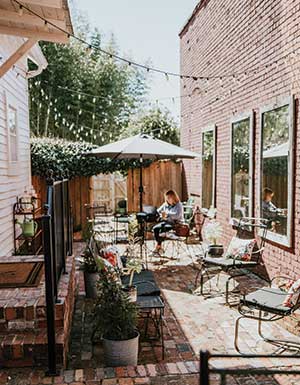Where everybody knows your name… and your business
Story by Elaine Hobson Miller
Photos by Mackenzie Free
and Contributed Photos
Mornings at Shaw’s Barbecue in Ashville are a lot like evenings at the “Cheers” bar of 1980s television fame. It’s a place and time “where everybody knows your name.”
Day after day, week after week, the parking lot at Shaw’s is filled with the same cars and pickup trucks. Most of them arrive around 7 a.m., when the place opens. Inside, the tables are filled with the same men in overalls and work shirts, jeans and tees and baseball caps. They are farmers, construction workers, bankers, wrecker service owners and bodyshop repairmen. They are hardworking men and retirees. Sometimes they are politicians, too, when offices are up for grabs.
They eat from Shaw’s menu of traditional Southern vittles like eggs and grits, pancakes, sausage and biscuits, with stout, hot coffee. What they really come for, however, isn’t on the menu. They’re there for the daily dish of tall tales, comedic retorts and a side of answers to the world’s woes.
“Hang around here long, and you’ll get dizzy,” says Ray Stevens, retired owner of a local service station and towing business.
Stevens sits at the same table with the same three men every day: Bobby Welch, owner of B&W Construction; Jim Wilson, retired owner of C.D. Wilson Contracting; and Jeff Corbin of Corbin Services. It is variously called the Wisdom Table, the Table of Knowledge or the Think Tank. An unknown female customer dubbed it The Gauntlet because, as the table nearest the door, a customer has to pass it to get anywhere.
“The amount of wisdom that comes from our table can’t be consumed in one day,” says Welch. “Before I came here, I was seeing a therapist twice a week; now I see one four times a week.”
And so the repartee begins.
“The Wisdom Table holds court, picks the topics of conversation,” says Skip Shaw, owner of Shaw’s Barbecue for almost 40 years. “Leave your feelings at the door when you come in.”
“The biggest thing we do is solve all the problems of the city,” says Dennis Moyer, a retired Lieutenant Commander in the U.S. Navy and former Ashville rural mail carrier. “We tell the city how to run it, but they don’t listen to us.”
Once you get past The Gauntlet, you’ll find Phillip Gleason and Matt Sims eating together at another table. Gleason, a veterinarian, comes to learn about what’s going on in St. Clair County. “I come for the fellowship every day but Wednesday, when I have a meeting elsewhere,” he says. He lives in Steele, and swings by on his way to Argo Animal Clinic. “We learn stuff here before it becomes public.”
Pointing to Carl Smith of Smith Farms, Gleason proclaims, “That’s the Chandler Mountain tomato man.” Pointing to Cody Green, he says, “That’s the Straight Mountain tomato man.” It’s a friendly rivalry, but it helps delineate between the two. Smith grins and responds with, “They call me Mater. I’m here every morning. Shaw’s serves really good food, and I enjoy the company. The topics run A to Z.”
Matt Sims, known as Matt-Matt, lives by the Ashville Stockyards, about a mile away. Someone at the Wisdom Table points out Matt’s big feet. “You know what that means,” one of the guys says. Wink, wink and raucous laughter follow. Dennis Moyer says Matt-Matt, described by Skip Shaw as a jack of all trades, is always fun to be around, always has a smile. “We kid him about his women problem, try to fix him up, but we are always a failure,” he says. “He’s a jovial guy.”
Asked why he tolerates the teasing, Matt-Matt grins broadly and replies, “Cause I learn what’s going on in the county.”
Pete Morrow, retired from ACIPCO, sits at the same table every morning with Dennis Moyer. “The food’s good, but I come to get knowledge from these four,” Morrow says, gesturing toward the Wisdom Table to his right. “I come to learn how to run a business, how to treat people. I came here before Shaw bought it. It was Sharp’s then. Everybody knows everybody here, it’s good food, and on Friday nights they have fried catfish.”
Moyer says he goes because the food there is hot and homemade from scratch, and because his wife won’t get up and cook breakfast. “I usually eat something simple like eggs, but she (the cook) makes good pancakes, biscuits and gravy.”
He says he goes for the camaraderie, too. “It’s a bunch of us old guys, like the old Round Table that used to meet at the drug store (Ashville Drugs). We meet and throw our brains out and come up with a solution. Pete and I sit next to the Table of Knowledge, wheretwo are cattlemen and two are retired bankers. Skip has a herd, too.”
According to Moyer, the regulars talk about things the city is doing. “The big topic now is the subdivision Lyman Lovejoy is developing near the Industrial Park,” he says. “It’s a big subdivision for Ashville. We talk a lot of politics, too. It got very heated when (St. Clair Commission Chairman) Stan Batemon was running. He was hot and heavy there during that time. (Former Alabama Chief Justice) Roy Moore comes in from time to time. We have all kinds of dignitaries stopping by.”
The crowd doesn’t cut politicians any slack, either. They once took a former Ashville mayor to task for taking credit for a civic project that he had little to do with. Then a candidate for re-election, he left in a huff!
John Harrison is another regular who comes for the food. He likes to eat at small, local places rather than large chains. “We settle the world’s problem here,” he says. A semi-retired farmer, he’s only there two to three times a week. “It’s mostly gossip and B.S. around here,” he says. “Skip talks to everybody, he doesn’t miss nobody.”
In fact, Shaw’s daughter, Lori, who sometimes helps out at the restaurant, says that Skip is the main reason most of the regulars are there in the first place. “All these guys come for dad … and stay for the food,” she says.
As if on cue, Skip Shaw sits down beside Mater. Wilson hollers, “Get him to tell you about his lady friend and the $150 bottle of wine.” It’s a running joke that refers to an auction that benefitted Shoal Creek Community Center. They tease Skip mercilessly about the auction, and the price of the wine gets higher with each re-telling.
“It’slike the movie, Groundhog Day, same thing every morning,” Mater says. “They always bring up the story about Skip and that woman.”
Shaw bought the place in 1984, and says he eats his own food. “I’m a product of it,” he says, patting his belly. “A third generation of folks (customers) come to eat here now, lunch and supper. I would not be where I am without my customers.”
He says a fire during the COVID pandemic shut him down temporarily and almost did him in. “It was an electrical fire in the back,” he says. “We were closed for eight months. That was back in 2020-2021. I thought about closing. But the place needed a facelift anyway, so here we are. I’ve been back in business about two years now.”
You won’t find any thin-skinned folks there each morning, Shaw says. “The guys who are here are hardy folk who don’t get their feelings hurt easily.”
There are few women in the early-morning crowd, although they begin to drift in with their dads and husbands around 9 a.m. When Barbara Stevens walks in, Jeff Corbin yields his seat to her at the Wisdom Table. She’s Ray’s wife. Soon, a few more regulars drift in, including Don Sharp and Joe Jinright, both retirees. Jackie Vaughn of Vaughn Body Shop plops down nearby.
Ray Stevens decides to call local real estate mogul Lyman Lovejoy, another regular who, for some reason, hasn’t dropped by yet this particular morning. But he’s there within five minutes of receiving Stevens’s call. “These guys could be lawyers,” Lovejoy says, “because they tell the truth in a lot of different ways.”
Stevens nods toward Lovejoy and says, “His Bible has only a front and back cover, no pages between.” Then Stevens gets taken to task for blocking the fire hydrant in front of Shaw’s with his truck. “No problem,” one of the guys says. “Ashville hydrants are dry anyway.”
Jeff Corbin agrees. “I watched my place burn down one day after the fire department tried three hydrants and couldn’t get water from any of them.”
Jim Wilson says primary cook Amanda Leftwich is the one who keeps the place going, “without a shadow of a doubt.”
“I kid everybody, tell ‘em she runs the place, I just work here,” Skip Shaw says of Leftwich. “She’s the main cog that makes everything turn. I’m fortunate to have her.”
His sister-in-law, Debra Meadows, makes the pies. “We do four – apple, peach, chocolate and coconut,” Shaw says. “Sometimes she adds sweet potato in the fall. We serve sandwiches, plate lunches, beef, chicken, smoked turkey. Our menu is pretty well-rounded, with something for everyone. We have salads, too, and daily vegetables. I’ll smoke meat maybe, but Amanda does most of the cooking. We have three or four women working here every day, and sometimes my daughter, Lori, helps out, too.”
Leftwich has been working for Shaw for 12 years. “My customers are very good to me,” she says. “You know that old saying, ‘Don’t believe anything you hear, and only half of what you see,’” she remarks. “It applies here.”
“What you say here WILL be held against you,” says Skip Shaw, emphasizing the word, “will.” “We have selective memories: We select everything and remember all of it!”











